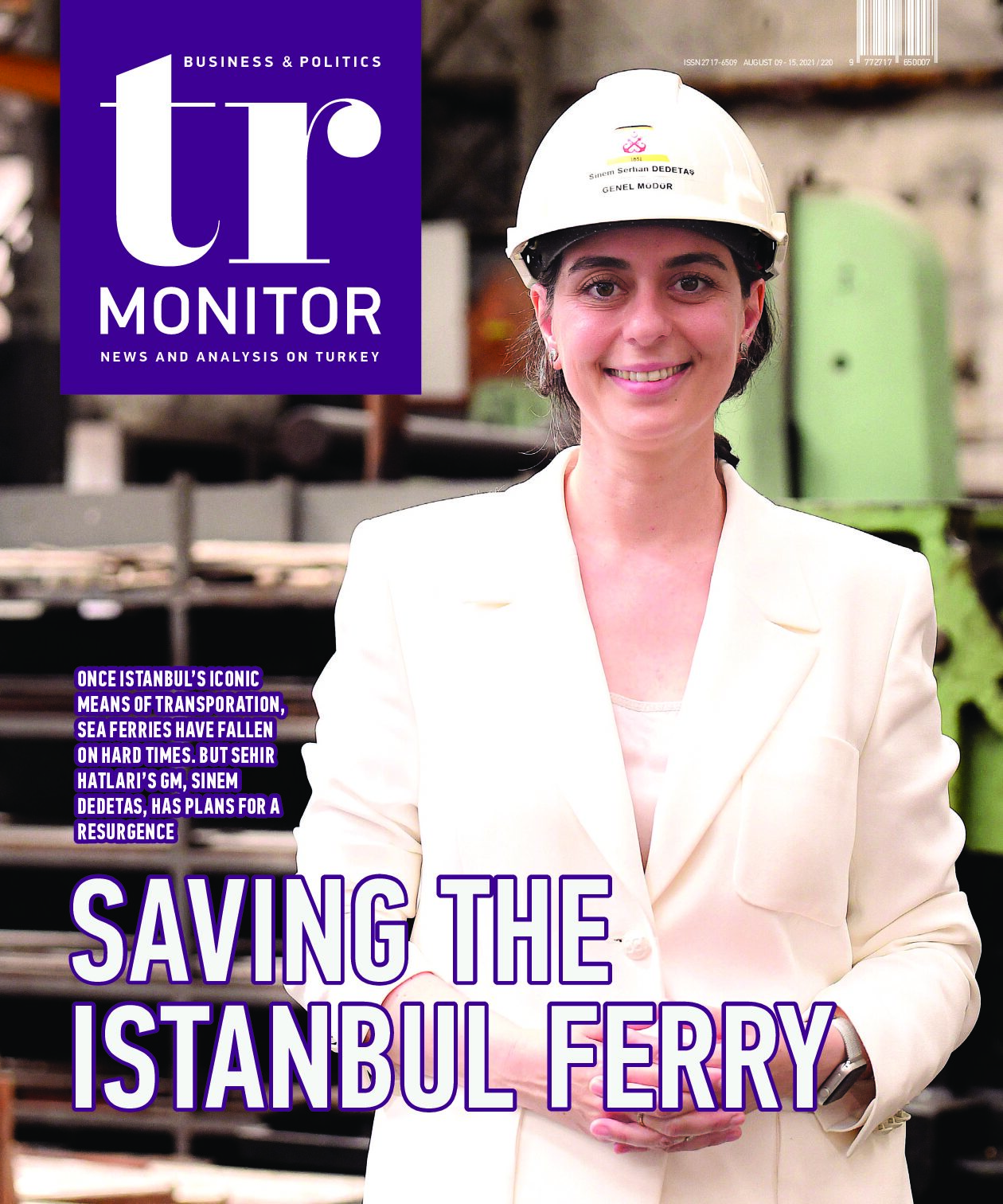By HUSNIYE GUNGOR
SEHIR HATLARI, an Istanbul Metropolitan Municipality (IBB) subsidiary providing public sea transportation services in Istanbul, has gone through many changes in its 200-year history. But since Sinem Dedetas, the first ever female general manager of the company, took over in August 2019, changes have accelerated.
You can feel the change even before you enter the shipyard site, headquartered at Halic Tersanesi, one of the oldest shipyards in the world, along with the Venice shipyard. As I was waiting for our photo editor for our interview with Dedetas in a café run by IBB just next to the shipyard entrance, the waiter asked me whether I work for Sehir Hatlari. He was right to ask: among many changes Dedetas has made, female employment has been one of the big one. Women on the Sehir Hatlari payroll have increased by 60% since she was appointed.
Other changes have pulled the company back from near collapse. Just a decade ago, the outlook was heartbreaking, Dedetas remembers, not only economically but morally as well. Halic Tersanesi, the only remaining shipyard of the three that existed side-byside at Tersane-i Amire, the maritime base of Ottoman Empire, was left idle since 2010. It was going to be privatized to build ‘Europe’s biggest Science Center’ by a foundation owned by Recep Tayyip Erdogan’s son-in law, Selcuk Bayraktar. There were only 28 ships in the company’s inventory and it was only able to run sea transportation services with the help of 30 boats rented from private companies. Plus, it had TRY 2m in debt on its balance sheet.
Starting with very small cost-saving measures, like “turning off the air conditioner if the windows are open,” as Dedetas tells it, they closed the year 2019 with TRY 7m surplus in only six months. Sehir Hatlari immediately stopped outsourcing maintenance work, which is four times cheaper when it is done within Halic Tersanesi.
The main target for Dedetas for 2020 was to get the shipyard functioning again. Sehir Hatlari has two main business lines: sea public transportation and shipyard services, which has been left idle for some time. As a public service given to Istanbulites via IBB as the main buyer, sea transportation was not profitable. “So, the best thing was to get the shipyard running again,” Dedetas says. “There are three dry docks here. We were sitting on capital at Halic Shipyard, a place where you can earn income without making an extra investment. We’ve seen that.”
SHIPYARD TO GENERATE TRY 130M IN REVENUES IN 2021
Apart from the maintenance of its own fleet, Dedetas opened the shipyard to the public. They participated in public tenders and made agreements with the private sector. “We have increased the shipyard’s maintenance activities, including commercial vessels, small boats and our own vessels. This alone created TRY 50 added value for 2020,” she notes adding that this will increase to TRY 130m in 2021 with new projects.
Of these, the shipyard has already started to build 56 small boats, 50 of which will be called sea taxis. The other 6 vessels are being built for ISTAC, an IBB subsidiary waste management company.
The ferry named Fenerbahce, on display at Koc Museum, is also docked at the shipyard for maintenance. One of her two sisters, Pasabahce is also at the shipyard for maintenance. She had been used by the Beykoz municipality as a wedding venue and was then donated to IBB under the condition that it would fixed and put to use on Bosphorus for sea transportation in two years.
“This 1952 Italian-made ship is really in bad condition. As we are spending public money, we are doing our best to bring her back to life in the most economical way as possible,” Dedetas says.
After 60 years on water as the fastest of the fleet, Pasabahce is very important for Istanbulites. There are people who were born on this ferry, sailors worked on it for years. Some people are also critical about why money is spent on such an old ferry. So, Dedetas and her team is doing their best to find a balance between a city’s maritime history and a limited budget. The good news is that there are some private companies which want to sponsor the maintenance of this ‘legend,’ either with paint work or furnishing.
“It is not easy,” Dedetas says, “As a public company there are some procedures that we have to follow and everything has to be done through tenders. But we will manage to fix her with sponsorship. We see her as a value that should be protected.”
INCREASING SHARE OF SEA IN PUBLIC TRANSPORT
Once in its history, sea usage in public transport was nearly 99% in Istanbul, today it has dropped to only 3%, according to Dedetas. Part of this decline is because of bad strategic decisions by previous local administrations and
the reality that Istanbul has grown away from the sea in both north and south. “We want to build ferry boats or piers instead of tunnels or bridges. We want to solve Istanbul’s traffic problem via sea transportation and make the people of Istanbul love the sea again,” Dedetas says.
One small step is the playgrounds built on the ferries with a TRY 3,000 investment each, which have been popular among people.
Under normal conditions, not only sea transport, public transport in Istanbul is actually a loss-making service, except for the metro lines. However, with pandemic restrictions, sea travel has been reduced by 90%, Dedetas notes. “The current passenger loss is 50%.” Current ticketing price should be five times higher in order for a profitable operation but it is not the priority for Sehir Hatlari. Instead, they want to increase the sea’s share in the public transport network.
“For this we are running integrated projects with IBB’s other subsidiaries, affiliates and Directorate of Public Transportation Services. In order to encourage sea transport, we made a connection to the newly-opened Alibeykoy tram line from the opposite side of Halic. We will do the same once the Rumelihisari tram line is completed. With IBB Mayor Ekrem Imamoglu’s vision to increase the share of sea transport, I feel lucky that all public transport functions share same vision willing to make an integrated effort.”
Sehir Hatlari is currently running as many trips (636 a day) as possible with its 28 ferries. Under Sinem Dedetas’ management, the company started night trips between the Anatolian and European sides, a 24-hour service for Prince’s Islands. Kadikoy was included as a stop to the Ortakoy-Uskudar line and the new Beykoz-Sariyer line was launched.
“There is a demand for a line from Silivri and Belyikduzu, at the west end of the city, to Uskudar. However, only 16 passengers will use it according to simulations. We can’t take this as an excuse but we have to start the line with low frequency as a beginning and make it a habit for the people of the city in time. But this needs serious investment and we have to be careful about spending the public’s budget. That is why we wanted to start with small vessels.”
SEA TAXIS TO START THIS SUMMER
Ekrem Imamoglu also asked Dedetas whether building small vessels in line with Istanbul’s silhouette is possible. She was really happy to hear it, as small vessels were her research subject as a marine technology engineer. This is what people call sea taxi, which are not actually taxis. “We are also working on a better name,” Dedetas says.
We are designing a larger concept for this service. They would be both called for anywhere, anytime, like a taxi, and be used as new possible lines where public transport is not available.
Dedetas has designed these vessels herself and engineering work was also done within the shipyard. 45 are currently under construction and 10 will be launched this summer. Dedetas says that they want to build electric versions and searching for a grant from European Union, which plans to allocate a lot of resources for sea vessels that work with sustainable resources. Once the vessels are tested in Istanbul within the Sehir Hatlari system, the plan is also to export them to other countries.
Sinem Dedetas’ next step will be growing the fleet of the Sehir Hatlari. The sea taxi is just the start of her vision. “Our target is to leave the company with no fleet problem to the next management, which may change with the next elections,” she says. However, since the average occupancy rate of the current fleet is 20%, new vessels will be small, for 500-700 passengers instead of the current 1,500, 1,800 and 2,100 passenger capacities. And they will look like classical ferries that Istanbulites are very fond of…
***
WHO IS SINEM DEDETAS
Born in Eskisehir in 1981, Sinem Dedetas graduated from Istanbul Technical University Faculty of Naval Architecture and Ocean Engineering with the title of Shipbuilding and Marine Technology Engineer. She completed her master’s degree in Shipbuilding and
Ship Machinery at the same faculty. She started her career as a structural analyst and structural design engineer at Delta Shipping and then continued her career as a plan approval engineer at RINA (Registro Italiano Navale). DedetaƔ, who was the general manager of Matesis Maritime and Engineering company, worked as a researcher, program coordinator and manager in national and international maritime activities and R&D projects during this period. Shipbuilding and management, energy efficiency, optimization, use of different materials in ship structure, inland sea transportation and small boats are her main research subjects. Between 2014-2016, she served as chairperson of the Board of Directors of the Chamber of Ship Engineers of TMMOB.
60% INCREASE IN FEMALE EMPLOYMENT
The ferries of Sehir Hatlari have free Wi-Fi and in July cafes on the ferries were reopened. IBB’s food chain, BELTUR, used to run the ferry cafes but they were closed due to COVID-19 measurements. Sehir Hatlari employed 83 of BELTUR workers in the new cafes, which has a completely new menu as well as simit, tea and ferry toast, all classical tastes for people. Fresh grind coffee, sugarfree and gluten-free food is included in the menu at affordable prices. The company, which increased employment by 56% in 2021 has increased its women employment by 60% during this time.
Sehir Hatları in numbers
898 personnel
28 ferries
22 lines
48 piers
636 daily trips
40M annual passengers










